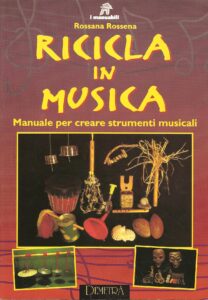Recycled music
Every now and again I make an assault on my collection of books in an effort to organize them a bit better. Don’t usually have much success as books are one of my great weaknesses and Amazon frequently drops a few more onto the doormat – vicious circle really.
But this one caught my attention and I thought I would bring it in here. It has been used quite a few times surprisingly enough in spite of its ‘unusual’ content.
I belong to a non-profit association, and have done for some 20 years now. As inspiration strikes, each of us over the years has suggested various activities which we prepare for the ‘locals’ of all ages. Maybe it’s down to my cultural background and traditions that my events are often considered ‘strange’ but are usually embraced with bemused enthusiasm by the rest of the team.
And this is where this book comes into the story, because one year I convinced everyone to collect ‘rubbish’ for a couple of months – clean rubbish of course – from the kitchen roll carton tube (no loo roll tubes thank you), to the empty coke cans, to the corona bottle caps, to the old inner tubes, saucepan lids, shells etc.etc. We had mountains of the stuff – and we made a sample series of musical instruments using what we had found with the addition of some dry lentils, beans and so on. Then at Carnival time, we set up a local hall with tables all around the hall with mounds of the ‘rubbish’ and all the tools necessary to create and decorate the ‘instruments’ – and then waited for the onslaught of kids and adults which followed. Where there is free food and drinks and a party, very few people hold back!

It was fascinating to watch (and help) as the parents, with a little assistance from ourselves, helped their kids make all sorts of instruments over the next couple of hours, and then join in as our guest percussion band taught the kids to ‘play’ the instruments.
Great day – and my suggestion is, if you have anything to do with children as teachers – or just as parents, this is a great party piece and I’m pretty sure that you can find a similar book in English. If you want any specific ideas about the instruments, just give a shout. Some of them are pretty obvious, like hammering saucepan lids with wooden spoons, but there are others which are a bit more complex …
NB. Not much of the material is suitable for very small children as a lot of recycled bits have sharpish or jagged edges – just think of drink cans or bottle tops for instance. Adult assistance is essential for this activity.





